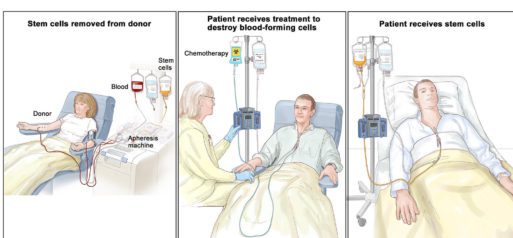
The Geneva Patient may now be cured of HIV after receiving a stem cell transplant for HIV-related cancer.
A Swiss man is possibly cured of HIV after receiving a stem cell transplant in 2018 for sarcoma. Since then, scientists have closely monitored his blood for any markers of HIV infection, which have been undetectable for over 20 months. Based on these results, they believe he may be functionally cured. If so, the patient (dubbed the “Geneva Patient” for the city where he received his treatment) would join a small club of five others whose HIV has been cured or possibly cured by stem cell transplants. All previous cases, though, involved stem cell transplants from donors who possess a rare genetic mutation that prevents HIV from entering cells, thus conferring a natural level of resistance. The Geneva Patient is unique in that his stem cell donation did not possess this genetic mutation.
Previously, a few other patients with HIV who developed blood cancers and received a stem cell transplant from donors without this genetic mutation experienced limited remission of HIV, but none lasted longer than 10 months. The Geneva Patient’s case points to intriguing possibilities for further HIV research and treatment. However, given that other effective treatments for HIV now exist, doctors consider it unethical to perform a stem cell transplant on someone with HIV but without cancer due to the procedure’s high toxicity and life-threatening risks.
Even in the case of the Geneva Patient, his stem cell transplant journey has been long and grueling. He was diagnosed with HIV in 1990, and in 2018 developed a rare and aggressive form of sarcoma. He underwent radiation, chemotherapy, and then a stem cell transplant, but then developed graft-versus-host disease a condition in which the donor’s immune cells start to attack the host’s body. He was then started on a course of immunosuppressant drugs.

Credit: Theresa Winslow LLC via National Cancer Institute
After spending several years recovering and doing well, he and his doctors decided to pause antiretroviral treatment used to treat HIV in November 2021. Since that time, no HIV markers have been detected in his blood. Scientists don’t know if the graft-versus-host disease or, perhaps, the immunosuppressant drugs he received as treatment helped eradicate HIV.
Although treatment for HIV has drastically improved since the disease ravaged LGBTQ communities at its peak, 630,000 people still died from HIV-related illnesses worldwide in 2022. The possibility of potentially curing the disease would be a huge advancement in medicine. And while it still may be far away, the Geneva Patient’s results are encouraging. As for the Geneva Patient, his outlook on life is bright. In a press release, he shared, “What is happening to me is magnificent, magical,” and that he was “looking to the future.”

 Could a Stem Cell Transplant Cure HIV?
Could a Stem Cell Transplant Cure HIV?



 How to Comfort A Dying Loved One
How to Comfort A Dying Loved One
 Our Annual Seven Holiday Gifts for Someone Who Is Grieving, 2024 Edition
Our Annual Seven Holiday Gifts for Someone Who Is Grieving, 2024 Edition














